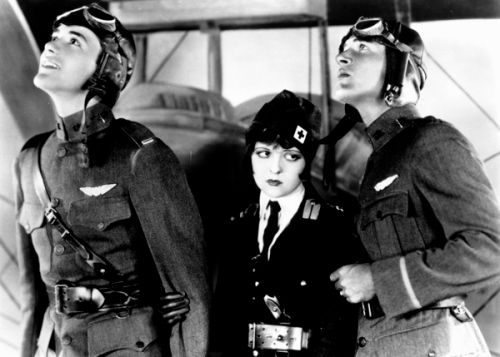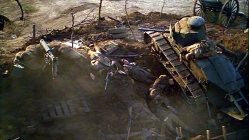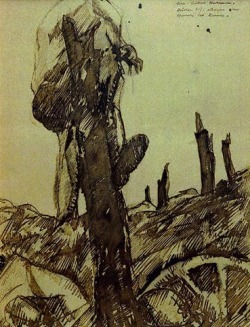Today is Veterans Day, and as I explained last year, I always focus my attention on the end of World War I. November 11, 1918, was the official ceasefire of The War to End All Wars, on the eleventh hour of the eleventh day of the eleventh month. My fascination with WWI is not with battle strategies, but with the individual soldiers and the horrific conditions they endured in the trenches. I struggle to imagine coping with the fear, the noise, the cold, the wet, the mud, the gas, the hunger, the monotony—and then going over the top to run into machine gun fire and shells and barbed wire, just to gain a few yards of ground which would be lost in the next skirmish.
Last year, I posted World War I art with some devastating facts and statistics. This year, I am discussing some films about WWI, because it is through them that I’ve gained so much insight into what the war was like for the soldiers we honor today. It’s also timely because one of the big Christmas movies next month is War Horse. Like War Horse, many of these films were novels first. There’s a 51 year gap between the films I discuss, jumping from 1930 to 1981. I hope readers can fill this gap by telling me some WWI movies made during these years.
The Sinking of the Lusitania (1918) Here’s a video of Winsor McCay’s animated film depicting the sinking of the Lusitania by German torpedoes in May, 1915. The anti-German sentiments expressed in the intertitles are intense, but the comments under this video show that these feelings haven’t gone away.
J’Accuse (1919 and 1938) Abel Gance used actual soldiers just returning from the front in his 1919 anti-war film. It had a huge impact in Europe, where it was shown just five months after Armistice. The US version was drastically re-cut to have a happy ending, and the anti-war message was changed to a patriotic one. Critics who saw the original version were appalled, and the film was not a success in the States. Gance later re-made the film in 1938. It’s really hard to find good copies of either the original or the remake, but a new restoration of the 1919 film was shown at a recent San Francisco Silent Film Festival, so I’m hoping it will become available on DVD soon.
The Big Parade (1925) This silent film by King Vidor was one of the big hits of the silent era. It stars John Gilbert and Renée Adorée. It hasn’t yet been released on DVD, which doesn’t make any sense to me. I haven’t seen it yet, but it’s on my wish list.
Wings (1927) Since this was the first film to win the Academy Award for Best Picture, you’d think it would be readily available. It’s the only Best Picture not available on DVD in the US. I met the director’s son last year, and we discussed our mutual frustration about this. William A. Wellman directed feisty Clara Bow, stalwart Richard Arlen, Gary Cooper, and Mary Pickford’s future husband, Charles “Buddy” Rogers, in this WWI epic about fighter pilots and the girl next door who becomes an ambulance driver.
All Quiet on the Western Front (film: 1930) Erich Maria Remarque’s 1929 book was made into the film starring Lew Ayres. It was re-made in 1979 with Richard Thomas, but I have not seen that version. The final scene of soldier Paul Baumer reaching for a butterfly is still devastating. Lew Aryes was deeply affected by the movie’s message. He was a pacifist who became a conscientious objector in WWII. This had a negative impact on his career, even though his service in the Medical Corps earned him three battle stars.
Gallipoli (1981) Often included in lists of Best Australian Films, Peter Weir directed this story of two young Australian soldiers who lose their innocence fighting in Turkey. This film is very powerful but has some serious historical inaccuracies. The disastrous charge at the Battle of the Nek was ordered by an Australian officer, not a British one. I love the fact that half of the skilled horse riders used in the film were women disguised as men.
Legends of the Fall (film: 1994) I saw this brutally violent film several times in the theatre because of the beautiful cinematography and the hunky Brad Pitt. It’s amusing to count how many times Pitt is filmed with a glowing halo of backlight around his blonde head. It’s not subtle. When his younger brother enlists and goes to France, Brad Pitt’s character joins up to keep his brother safe. There’s plenty of gas and barbed wire, not to mention scalpings. While not a “war film,” this was one of the first movies I saw with WWI scenes, so they had an impact on me.
A Little Princess (1995 film) The original story is about an English girl whose father is fighting in the Boer Wars. In this 1995 film version starring Liesel Matthews, Sara Crewe is a girl with an English father and an American mother. The boarding school is moved to New York, and her father goes to fight in France in WWI. I love this version, so it’s one of the rare times I don’t mind the Americanizing, and the story still works just fine. There are several realistic trench scenes with Sara’s father. Even though Liesel Matthews is an heiress to the Hyatt fortune and worth millions, don’t hold it against her. She’s a great Sara.
Regeneration/Behind the Lines (film: 1997) The first book of Pat Barker’s excellent Regeneration Trilogy was made into a fine film starring Jonathan Pryce, Jonny Lee Miller, and James Wilby. James McAvoy is credited, but his role is so tiny it’s almost impossible to spot him. It’s about several characters at a psychiatric hospital in Scotland during WWI, including poets Siegfried Sassoon and Wilfred Owen. Pryce plays a psychiatrist trying to help his shell-shocked patients. Sassoon has been sent to the hospital instead of a court martial after he publishes a letter speaking out against the war. This film is hard to find on a US DVD, where it was renamed Behind The Lines, and even in the UK the DVD is a Dutch import. I hope this changes soon.
The Trench (1999) Paul Nicholls and Daniel Craig star in this wrenching drama about young British soldiers on the eve of the battle of the Somme. Craig is excellent, and the young soldiers are played by young actors, conveying the inexperience of many of the troops who didn’t survive the first hours of their first battle.
Deathwatch (2002) I can’t recommend this strange horror film about British soldiers who stumble into a trench containing a deadly supernatural being. I only watched it because of the cast, which includes Jamie Bell, Matthew Rhys, Laurence Fox and Andy Serkis. I suffered through it, but you don’t have to, unless you really like muddy horror films.
A Very Long Engagement (film: 2004) This is one of my favorite WWI movies. It’s long, complicated, in French with subtitles, and you really have to pay attention to keep track of the characters. Maybe it’s just me, but put a group of men in mustaches and they all look the same. This film has a lot mustaches! It’s about a determined young woman (Audrey Tatou) who can’t accept that her fiancé (Gaspard Ulliel) has been killed in WWI. She searches for clues to what really happened to him and four other soldiers condemned for self-mutilation. It’s a war film, a mystery, and a love story. Marion Cotillard is wonderful in a supporting role, and even Jodie Foster shows up to show off her French.
A Bear Named Winnie (2004) A family film telling the true story of a Canadian soldier who adopts a black bear cub, smuggles him to England, and leaves him in a zoo when he goes to France. Winnie the Bear, named after Winnipeg, becomes a beloved zoo attraction and inspires AA Milne’s Winnie the Pooh stories. The film stars Michael Fassbender, Gil Bellows, Jonathon Young, David Suchet, and Stephen Fry. There’s only one war scene, still pretty intense for younger viewers, while the rest of the film focuses on the antics of the cub. The film has a leisurely pace, and Fassbender and the bear have great chemistry.
Joyeux Noel (2005) One of the most remarkable events of WWI was the 1914 Christmas truce, depicted in this French film, when unofficial ceasefires in some regions during Christmas led to football games, carol singing, and gift exchanges between enemy soldiers. Joyeux Noel was praised by critics and viewers, and I still need see it.
Passchendaele (2008) Canadian Paul Gross wrote, directed, and stars in this film using details from his grandfather’s life. I was expecting the focus to be on the battle of Passchendaele, but most of the movie takes place off the battlefield. That’s not a complaint. I don’t think the movie teaches an uninformed viewer much about the actual battle, but it’s not supposed to be a documentary.
War Horse ( film: 2011) Opening this Christmas, War Horse is based on Michael Morpurgo’s book for older children. The play won the Tony Award last spring. I read the book this summer, and it was 160 pages of pure grief. Any parent giving their child this book should read it first to judge whether their kid is mature enough to handle it. I don’t think I’m there yet. I hope parents are also careful about taking children to see the film. I will be reading the reviews to see if parents are cautioned. The trailer promises a beautiful film and the cast features some favorites, but I’m taking plenty of tissues.
Birdsong (film due 2012) One of my favorite WWI novels by Sebastian Faulks, Birdsong has been filmed in the UK as a TV movie due in 2012. That usually translates into an eventual airing on PBS Masterpiece. The film stars Matthew Goode and Eddie Redmayne, and I can’t wait.
* * * * *
“And all those boys of Europe born in those times, and thereabouts those times, Russian, French, Belgian, Serbian, Irish, English, Scottish, Welsh, Italian, Prussian, German, Austrian, Turkish—and Canadian, Australian, American, Zulu, Gurkha, Cossack, and all the rest—their fate was written in a ferocious chapter of the book of life, certainly. Those millions of mothers and their millions of gallons of mothers’ milk, millions of instances of small-talk and baby-talk, beatings and kisses, ganseys and shoes, piled up in history in great ruined heaps, with a loud and broken music, human stories told for nothing, for ashes, for death’s amusement, flung on the mighty scrapheap of souls, all those million boys in all their humours to be milled by the mill-stones of a coming war. — from A Long Long Way by Sebastian Barry




Watched “Death at a Funeral” last night – it was hysterically ridiculous and oh so fun in so many ways. The cast really made it work. Great film – thanks for yet another fabulous recommendation~! Who needs Gene Siskel when I’ve got you? You know what I like!
I’m glad you enjoyed it! Have you watched The Station Agent? It’s Peter Dinklage at his best. In my list here, I’d say you and your mom should watch A Little Princess. That is, if you haven’t already. I’ve seen it many times, but I’m ready for another viewing!
Terrific idea and list of films – surprised at how many I’ve seen, and will check into those that I haven’t. My brother and I got our heads together to add a few more.
The Dawn Patrol (1930) During WW I, British pilot Dick Courtney (Richard Barthelmess) is ordered to replace his commander and send his co-pilots out in unsafe aircraft. His new authority alienates Courtney from his fellow pilots, and the tension comes to a head. Now, the brother of his best friend, Douglas Scott (Douglas Fairbanks Jr.), is on a suicide mission. This compelling drama won an Oscar for Best Original Screenplay.
The Dawn Patrol (1938) Errol Flynn and David Niven co-star as beleaguered British fighter pilots coming to grips with the realities of combat in this soaring wartime drama — a remake of the 1930 classic. Facing enemy fire, open-air cockpits and ballooning casualties, the flyers look to their stern squadron commander (Basil Rathbone) for leadership and support.
The Fighting 69th (1940) When streetwise Brooklyn boy Jerry Plunkett (James Cagney) joins the all-Irish 69th Regiment during World War I, his cocky attitude creates problems. Battling in France, his recklessness causes the deaths of several soldiers. But while awaiting punishment, Plunkett receives a chance to redeem himself. Based on the experiences of real-life military priest Father Francis Duffy (played by Pat O’Brien), this exciting war drama co-stars George Brent.
Sergeant York (1941) In a career-defining performance that earned him his first Academy Award, Gary Cooper stars as Alvin York, a poor Appalachian pacifist drafted into World War I. Placed in an impossible position, York single-handedly captures an entire enemy platoon and becomes a national hero. This World War II-era Hollywood classic based on the real-life war hero received 11 Academy Award nominations, including one for director Howard Hawks.
King of Hearts (1966) French comedy-drama film directed by Philippe de Broca and starring Alan Bates. The film is set in a small town in France near the end of World War I. As the Imperial German Army retreats they booby trap the whole town to explode. The locals flee and, left to their own devices, a gaggle of cheerful lunatics escape the asylum and take over the town — thoroughly confusing the lone Scottish soldier who has been dispatched to defuse the bomb.
Flyboys (2006) Excellent war drama set during World War I. Farm boy Blaine Rawlings (James Franco) joins up and soon finds himself on an adventure more exciting than he ever imagined as he and his fellow volunteer soldiers become the world’s first fighter pilots in the Lafayette Escadrille, the 124th air squadron formed by the French in 1916.
Masterpiece Classic: My Boy Jack (2007) Rudyard Kipling’s poem “My Boy Jack” is the basis for this touching tale of family and loss. Young Jack Kipling (Daniel Radcliffe) is rejected for service in World War I because of his myopia, but Rudyard pulls a few strings to get his boy into the Irish Guard. Jack rewards his family by overcoming his disability and rising to the rank of lieutenant. But when he goes missing in battle, it begins a lifelong odyssey by his father to find him.
See you at the movies…
Thanks for adding to the list, and for filling in some gaps. I love King of Hearts but it’s been so long since I’ve seen it, I forgot it was set during WWI. I also love Richard Barthelmess, and I think I watched his version of The Dawn Patrol a few years ago. I remember when My Boy Jack came on Masterpiece. I taped it to watch later, but then never did. You really have to take these films in small doses, since they’re often so tragic.
At long last – after 5 months – WINGS finally arrived in my mailbox. I was blown away by this film, and especially enjoyed the bonus feature. You have the choice between either orchestrated score or organ accompaniment – I began with orchestra, then started film over with organ as I thought it a better fit. Interesting that a color tint was used instead of gorgeous black & white: an uncomfortable golden hue (which I didn’t like); or a very effective blue for night and aerial shots. Flames and explosions were hand-painted in the impressive flying sequences. WINGS enjoyed an unprecedented 64-week limited engagement run before opening in wide release. HIGHLY RECOMMEND!
Great post! I definitely need to check out some of these films. I think WWII probably steals the show with war movies, but WWI has had some interesting depictions as well. I just watched the trailer for War Horse, it looks like it’s going to be great (and the cinematography alone is breathtaking).
Enjoyed watching “A Bear Named Winnie” last evening – such a fine film. One of my favorites, Fassbender, is divine in his role. Have “All Quiet on the Western Front” in stack from library to watch this weekend.
P.S. Listening again to POTO25 CD this morning – just can’t get enough of this incredible production – can’t wait until DVD release in February…
Still catching up with some WWI movie suggestions. Watched “All Quiet on the Western Front” (1930) the other night. OMG – what an incredible film, and without CG, but tons of real MUD to slog through. I think working on a film like this must be an awful experience, both physically and emotionally, for everyone involved. Thought that “Band of Brothers” and last year’s “The Pacific” depicted horrific war conditions accurately – really makes you wonder….
Believe I’ve caught up with WWI films for the time being. Latest, “Passchendaele” (2008) was an unexpected surprise. Paul Gross certainly put his heart and soul into all aspects of this production, both in front and behind the camera. Recommend this film highly to anyone interested in historical stories involving people in wartime.
As usual, like to plug in a video with my commentary…
Thanks for your passion and commitment! I especially like the music Paul Gross writes and performs. The song at the end of the movie, After The War, is one of his. I have one of his CDs, Love & Carnage, autographed and everything. It’s really good, especially the song Cherry Beach. I also like his song Ride Forever, which was used in an episode of his series Due South.